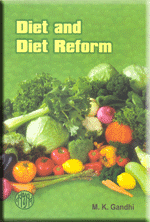
P.O. SEVAGRAM, DIST.WARDHA 442102, MS, INDIA. Phone: 91-7152-284753
FOUNDED BY MAHATMA GANDHI IN 1936
DIET AND DIET REFORM

DIET AND DIET REFORM
Table of Contents
PART-I
- SECTION I: General
- My Faith In Vegetarianism
- The Moral Basis of Vegetarianism
- Diet For Brahmacharya
- Green and Dietetic Ahimsa
- 'Food Faddists'
- Unfired Food Experiment
- Unfired Food
- Unfired Food
- Unfired Food
- National Food
- Minimum Diet
- For Four Rupees A Month
- A Talk to Village Workers
- Minimum Diet
- Plea for More Fruits
- Carrion-eating
- SECTION II : Rice, Wheat and Gur
- SECTION III : Soya Beans and Ground-nuts
- SECTION IV : Green Leaves, etc.
- SECTION V : Milk
- SECTION VI : Ghee and Oil
PART-II
- SECTION I : General
- Precautions Against Ills of The Season (M.D.)
- Dietetic Changes (M.D.)
- Mortification of The Flesh (M.D.)
- Vitamins - I (P. C. Ghosh)
- Vitamins - II (P. C. Ghosh)
- Physiological Basis of Nutrition
- Are you acid? (H. C. Menkel)
- What And How Much To Eat? (H. C. Menkel)
- Question on Diet (H. C. Menkel)
- Improved Diets (A. K.)
- Place of Cereals in Food (I. Amin)
- An Experiment in National Diet (Pyarelal)
- Revealing Figures (A. K.)
- SECTION II : Rice, Wheat and Gur
- The Miracle of Unpolished Rice (M.D.)
- Unpolished v. Polished Rice (Prof. Basu)
- Saving Cereals (D. K. Gupta)
- Useful Suggestion (M. A. Chadray)
- White v. Brown Sugar (M. D.)
- The Havoc of Sugar (M. D.)
- Bad Teeth and Refined Carbohydrates
- Potentialities of Palm Jaggery (Gajanan Naik)
- Nira - A Nutritious Beverage (Gajanan Naik)
- SECTION III : Soya Beans and Ground-nuts
- Warning against Soya Beans (M. D.)
- Soya Beans (M.D.)
- Soya Bean Recipes
- A Soya Bean Book (M. D.)
- The Utility of The Ground-nut (A. K.)
- SECTION IV : Fruit
- The Merit of Amla (A. K.)
- SECTION V : Milks
- Kimmed Milk and Buttermilk (W. R. Aykroyd and S. C. Dasgupta)
- SECTION VI : Ghee And Oil
- Edible Oils (P. C. Ghosh)
- Blindness At A Price (J. C. Kumarappa)
- Nakali Ghee (J. C. Kumarappa)
- SECTION VII : Tea
- Another Rising Menance (J. C. Kumarappa)
- Non-English Words With Their Meanings
About This Book
Written by : M. K. Gandhi
Edited by : Bharatan Kumarappa
First Edition : 5,000 copies, July 1949
ISBN : 81-7229-062-4
Printed and Published by : Jitendra T. Desai
Navajivan Mudranalaya,
Ahemadabad-380014
India
© Navajivan Trust, 1949
Download
Chapter 74 : Another Rising Menance
In the rural areas milk is already in short supply. If we sincerely desire the welfare of the people, our attempt should be to find out ways and means of increasing the supply. No doubt the cities are dependent on the villages for the milk. If an organization can be brought into being whereby the cities can run their own dairies in selected rural areas and be independent of the existing supply from the villages, that in itself will alleviate the distress in the rural areas. Of course, alongside of this programme we must have the long range programme of increasing the milk productivity of the cow by selective cattle-breeding.
Wherever people are in distress we always find somebody willing to take advantage of this distress. There are people willing to rifle the pockets of dead soldiers. Thus the distress of somebody presents an opportunity to someone else to take advantage of. At the present time the short supply of milk has provided a golden opportunity for the Indian Tea Market Expansion Board to carry on its destructive work. Mr. M. H. Miles, its Commissioner for India, is anxious to push forward to the villages and create the tea habit in the villages. This would imply, that by tanning the insides of the villagers and satisfying their hunger by decreasing the digestibility, we can automatically lessen their demand for milk! This is a real menace to the health of rural India. In a vegetarian country the animal protein from milk is an essential constituent of the diet. Any habit which is calculated to decrease this is harmful to the villages and is anti-social.
Papers carry advertisement "drink tea for stamina", which being lying propaganda must be stopped by the Government taking necessary steps to control the advertisements. Indian consumption of tea in 1928-29 was 48.8 million pounds and it has risen in 1945-46 to 130 million pounds. This is an increase of about 266 p.c. and yet they are carrying on a campaign of increasing tea consumption still further. Whatever may be said for tea for the well-to-do who are overfed, it is difficult to support the cause for tea in villages. The work of the Indian Tea Market Expansion Board, therefore, is a menace to the rural areas which are already starving and suffering from malnutrition. We trust the popular governments will do what lies in their power to prevent any irreparable damage being done by the formation of habits which will be injurious to the growth and strength of the village people.
J. C. KUMARAPPA
Harijan,
26-1-1947